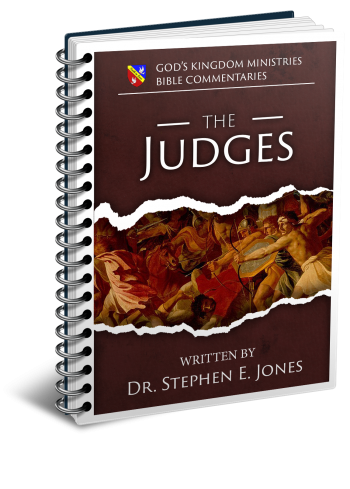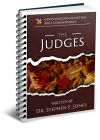Latest Posts
View the latest posts in an easy-to-read list format, with filtering options.

Two books in one. The first book is how the Judges themselves are named prophetically to give a message of Sonship. Book 2 is a commentary on the last 5 chapters of the book of Judges, presenting examples of how Israel was lawless after the death of Joshua.
Category - Bible Commentaries

Jephthah judged Israel for just six years and then died (Judges 12:7). After him came three minor judges in succession before the rise of Samson.
Ibzan judged Israel seven years (Judges 12:8, 9); Elon judged Israel ten years (Judges 12:11), and Abdon judged Israel eight years (Judges 12:13, 14). So from Jephthah’s death to the appointment of Samson there was a total of 25 years.
To put these Judges into context, we should know that Samson judged Israel for 20 years (Judges 16:31) and that he died shortly before the 40-year Philistine captivity ended. Hence, Samson judged Israel during the last half of the Philistine captivity.
By working backward, we can see that Ibzan was probably the Judge in the years leading up to the captivity, while Elon and Abdon judged Israel for 18 years (total) during the first half of that captivity while Samson was growing up. It is likely that Samson was born about the first year of the captivity and that he was about 20 when he was chosen as the Judge in the middle of the Philistine captivity.
In my series of novels, which are set in the time of the Philistine captivity, Book 2, Through Timeless Mountains, makes Ibzan the Judge when the elders had to decide whether or not to submit to captivity.
Ibzan’s name means “whiteness, splendid.” By inserting the meaning of his name into our sequence of Judges’ names, we can now add a further detail:
“The voice of God united in His sons (in an orderly manner that is subject to God’s Word) will fell the enemy by the power of the blood of Christ and by the light of transfiguration and will open the splendid Ark to show forth the light of the Sun.”
Judges 12:8 calls him “Ibzan of Bethlehem,” and so we see that he was of the tribe of Judah and was from the town where Jesus was later born. Jesus, of course, was the earthly manifestation of the glory and presence of God. In that he became the next Judge after Jephthah (“he will open”) Ibzan’s name adds a description to the Ark itself. The glory and splendor of God’s presence on the Ark is being pictured through Ibzan, the Judge.
Elon succeeded Ibzan shortly after the start of the Philistine captivity. He was from Zebulun, so named in Gen. 30:20 because his mother Leah believed that Jacob would favor her by “dwelling” with her. Jacob’s main tent was with Rachel, whom he loved, and this caused Leah to feel rejected. But when Leah gave birth to Zebulun, she thought that Jacob would move to her “dwelling place.”
When we factor Elon’s tribe, Zebulun, into the sequence of Judges’ names, the picture emerges of the splendor of the glory of God indwelling the Ark.
Elon’s name means “mighty,” as in a terebinth tree. His name is derived from the Hebrew word ayil, usually translated “ram.”
Therefore, his name pictures the Lamb sitting on the throne (Ark). A ram is a fully-grown lamb. Christ is pictured as the Lamb of God who was sacrificed for the sin of the world and who was later seated upon the throne (Heb. 1:8). So Rev. 7:9-11 says,
9 After these things I looked, and behold, a great multitude, which no one could count, from every nation and from all tribes and peoples and tongues, standing before the throne and before the Lamb, clothed in white robes, and palm branches were in their hands; 10 and they cry out with a loud voice, saying, “Salvation [Yeshua-Jesus] to our God who sits on the throne, and to the Lamb.” 11 And all the angels were standing around the throne and around the elders and the four living creatures; and they fell on their faces before the throne and worshiped God.
The passage continues to speak of Christ in Rev. 7:17, saying, “the Lamb in the center of the throne shall be their Shepherd.”
Hence, by adding the revelation of Elon to the sequence of Judges’ names broadens the picture for us. Not only is the Ark prophesied but also the Lamb who sits on the mercy seat, even as a king sits upon his throne.
“The voice of God united in His sons (in an orderly manner that is subject to God’s Word) will fell the enemy by the power of the blood of Christ and by the light of transfiguration and will open the Ark, revealing the splendor of the indwelling Christ, the Lamb of God, seated on His throne, showing forth the light of the Sun.”
The next Judge is Abdon (“servile”) or Bedan (“in judging”). The message of his name gives us the ministry of Christ as He sits upon His throne. In all of His Splendor and glory and honor, He still ministers to us as a Lamb. The message in the name of this Judge reveals the ministry of the Lamb on the throne. Though He is seated in His glory and splendor, He is humble as a Lamb. He did not come to be ministered to, but to minister to us.
The name Abdon has to do with service or ministry. He told His disciples that they were not to judge as men judge. Matt. 20:25-28 says,
25 But Jesus called them to Himself, and said, “You know that the rulers of the Gentiles lord it over them, and their great men exercise authority over them. 26 It is not so among you, but whoever wishes to become great among you shall be your servant, 27 and whoever wishes to be first among you shall be your slave; 28 just as the Son of Man did not come to be served but to serve, and to give His life a ransom for many.”
So we find that the Ark is the throne of Christ, where the Lamb is seated in all His glory, judging the world as its greatest Servant. He is also pictured as the Great Shepherd in Heb. 13:20,
20 Now the God of peace, who brought up from the dead the great Shepherd of the sheep through the blood of the eternal covenant, even Jesus our Lord…
He is a “great shepherd,” not because the sheep serve Him but because He serves the sheep and has their best interests in mind as he leads them to green pastures and still waters and as he defends them from predators. We too are called to do as He did and to be as He was and still is. This is not possible without having a servant’s heart, serving others and having their best interests in mind.
Paul says in 1 Cor. 6:2, “do you not know that the saints will judge the world?” Even so, God will not place anyone upon the throne of His glory who has not learned that authority is the power to serve others. The names of Abdon and Bedan are vital in the prophecy of the Judges’ names, for these present to us the ministry of Christ the Judge.
There are some who think that Christ came the first time as a servant but will rule as a king in His second coming—as if these are somehow separate. But no, Christ is not presented as the King on a throne, but as the Lamb on the throne. It is the great Servant who has been given all authority in heaven and in earth (Matt. 28:18).
He did not become a servant in order to earn the right to be served later. He proved His worthiness as the King by proving His love for all mankind as the great Servant and Shepherd of the sheep. He will never stop being the Lamb of God, even while He is the Lion of God. He is the Lion with all power, who is as gentle as a Lamb.
In Book 3, My Father’s Tear, we meet both Elon and Abdon. In the story, I explain why Abdon had two names: Abdon and Bedan. Judges 12:13 calls him “Abdon the son of Hillel,” but 1 Sam. 12:11 calls him Bedan, saying,
11 Then the Lord sent Jerubbaal [i.e., Gideon] and Bedan and Jephthah, and Samuel, and delivered you from the hands of your enemies all around, so that you lived in security.
It was common in those days to have more than one name. Gideon himself was known as Jerubbaal to commemorate his father’s defense after Gideon had “torn down the altar of Baal” (Judges 6:30, 31, 32). His father convinced the outraged Israelites to let Baal handle the insult himself, if he really had the power to do so. So Jerubbaal means “Let Baal contend.”
In my own novel, I portray Abdon, “servile,” as originally a devout follower of God, serving Him with all His heart. But then he contracts leprosy, which shatters his faith and forces him to be separated from his family and friends. We encounter him while traveling to Shiloh with Elon to keep the feast of Tabernacles and heal him of his leprosy. He would later succeed Elon as the Judge, and so his name was changed to Bedan, or b’dan, which means “in judging.” (The main part of his name is dan, “judge.”)
By inserting Abdon-Bedan’s name to the sequence of Judges, the revelation can be expanded to read:
“The voice of God united in His sons (in an orderly manner that is subject to God’s Word) will fell the enemy by the power of the blood of Christ and by the light of transfiguration and will open the Ark, revealing the splendor of the indwelling Christ, the Lamb of God, seated on His throne, judging the nations as the great Servant, showing forth the light of the Sun.”
This takes us to the story of Samson, whose name has to do with the light of the sun.